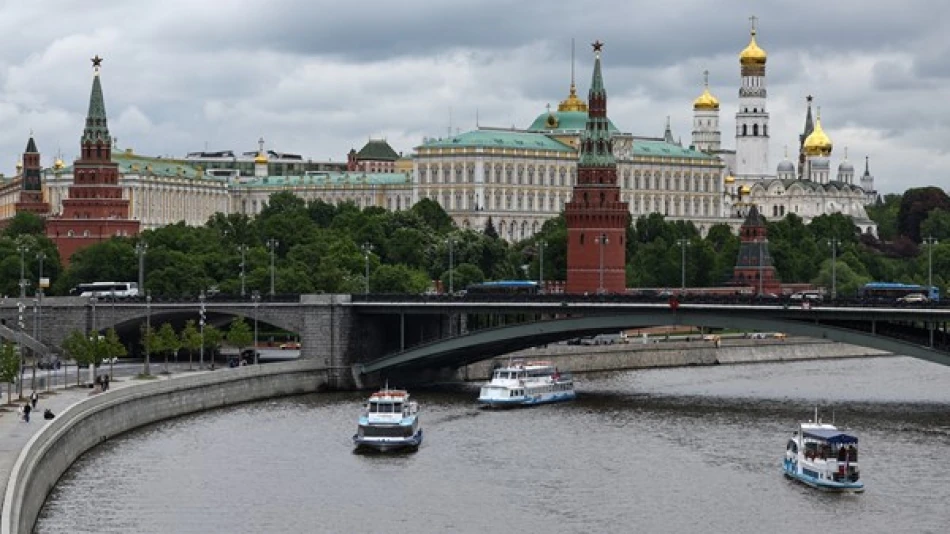
Kremlin Responds to Trump's Announcement of Deploying Two Submarines
Russia Downplays Trump's Nuclear Submarine Deployment as Diplomatic Tensions Escalate
Russia responded cautiously to President Donald Trump's announcement that he ordered the repositioning of two U.S. nuclear submarines, calling for "extreme caution" in nuclear rhetoric while downplaying the military significance of the move. The exchange marks the latest escalation in nuclear posturing between the superpowers as diplomatic efforts to resolve the Ukraine crisis intensify.
Kremlin's Measured Response to Nuclear Threats
Kremlin spokesperson Dmitry Peskov delivered Russia's first public reaction to Trump's Friday announcement, suggesting the submarine deployment represents routine military operations rather than a genuine escalation. "It's obvious that the two American submarines are already in combat readiness. This is an ongoing process," Peskov told reporters, effectively dismissing the strategic importance of Trump's announcement.
The measured response reflects Moscow's apparent strategy to avoid being drawn into public nuclear brinkmanship, even as tensions remain high. Peskov emphasized that Russia does not wish to engage in such debates, stating that "everyone should exercise extreme caution in nuclear discourse."
Strategic Context Behind the Submarine Announcement
Trump's submarine deployment order came as a direct response to comments by former Russian President Dmitry Medvedev regarding the possibility of war between the two nuclear-armed nations. This tit-for-tat nuclear messaging represents a return to Cold War-style psychological warfare, where submarine movements serve as both military positioning and diplomatic signaling.
The timing is particularly significant given that U.S. nuclear submarines maintain constant patrol schedules regardless of geopolitical tensions. Trump's public announcement of their "repositioning to appropriate areas" appears designed more for diplomatic pressure than operational necessity.
Ukraine Crisis Drives Nuclear Rhetoric
These developments unfold against the backdrop of Trump's ultimatum to Russia regarding new sanctions targeting Moscow and its oil buyers unless progress is made toward ending the three-and-a-half-year Ukraine conflict. The threat represents a significant escalation in economic pressure, potentially affecting global energy markets and Russia's primary revenue source.
The sanctions threat carries particular weight given Russia's dependence on energy exports, which have helped sustain its war effort despite existing Western restrictions. Trump's approach suggests a willingness to expand economic warfare while simultaneously pursuing diplomatic channels.
Diplomatic Channels Remain Open Despite Tensions
Despite the nuclear posturing, both sides continue diplomatic engagement. Trump announced plans to send envoy Steve Witkoff to Russia on Wednesday or Thursday, marking another attempt to broker a ceasefire. Witkoff has conducted extensive talks with Putin during previous visits, though these efforts have yet to produce a breakthrough.
The Kremlin's positive response to Witkoff's potential visit indicates Moscow's continued interest in dialogue, even amid escalating rhetoric. "We are always happy to see Mr. Witkoff visit Moscow," Peskov said, describing such communications as "important, meaningful, and very useful."
Historical Parallels and Strategic Implications
The current nuclear messaging echoes Cold War dynamics when submarine deployments served as key elements of superpower competition. However, today's context differs significantly, with economic interdependence and multiple global crises creating more complex diplomatic calculations.
Unlike the bipolar Cold War era, current tensions involve multiple stakeholders including European allies, China, and regional powers, each with distinct interests in preventing escalation while supporting their preferred outcomes in Ukraine.
Market and Global Impact
The nuclear rhetoric and sanctions threats have implications beyond military positioning. Energy markets remain sensitive to disruptions in Russian oil flows, while defense contractors and nuclear deterrent systems face renewed scrutiny from policymakers concerned about strategic stability.
The diplomatic dance between nuclear posturing and peace negotiations reflects both leaders' recognition that actual conflict would be catastrophic, while political pressures demand demonstrations of strength. This balancing act will likely continue as long as the Ukraine conflict remains unresolved, with submarine deployments and diplomatic missions serving as preferred alternatives to direct confrontation.
Most Viewed News

 Layla Al Mansoori
Layla Al Mansoori






